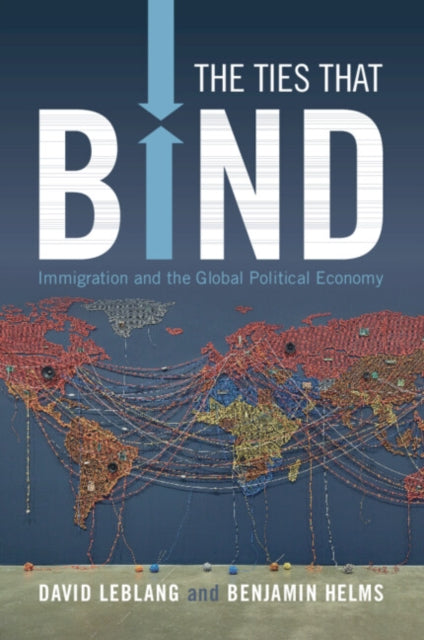DavidLeblang,BenjaminHelms
The Ties That Bind: Immigration and the Global Political Economy
The Ties That Bind: Immigration and the Global Political Economy
YOU SAVE £1.15
- Condition: Brand new
- UK Delivery times: Usually arrives within 2 - 3 working days
- UK Shipping: Fee starts at £2.39. Subject to product weight & dimension
Bulk ordering. Want 15 or more copies? Get a personalised quote and bigger discounts. Learn more about bulk orders.
Couldn't load pickup availability
- More about The Ties That Bind: Immigration and the Global Political Economy
Migration is a complex issue with many factors that cause people to leave their homes and seek a better life elsewhere. Political factors, such as the ability to participate in the political life of a destination, are as important as economic and social factors. Migrants continue to serve as a conduit for information and help drive investment to their homelands, and the relationship between migration and global markets is poorly understood.
Format: Paperback / softback
Length: 278 pages
Publication date: 09 February 2023
Publisher: Cambridge University Press
Migration is a complex and multifaceted issue that has become a central concern in both domestic and global politics. Despite its significance, there is a lack of comprehensive understanding of the causes, consequences, and relationship between migration and global markets. Migration is a costly and risky endeavor, yet many individuals decide to migrate in search of a better life. The decision to migrate is influenced by a multitude of political, social, economic, and environmental factors.
Political factors play a crucial role in determining why people migrate. The ability to participate in the political life of a destination country is a significant motivator for many migrants. They seek to escape political oppression, violence, or instability in their home countries and hope to find greater political freedoms and opportunities in their new destinations.
Economic factors also play a significant role in migration. Many migrants are driven by the prospect of finding better job opportunities, higher wages, and improved living standards. They may also seek to escape poverty or economic hardship in their home countries and hope to find a better life in a more prosperous region.
Social factors also contribute to migration. Migrants may be seeking to reunite with family members or join communities with shared cultural or religious beliefs. They may also seek to escape social exclusion or discrimination in their home countries and hope to find a more inclusive and welcoming environment in their new destinations.
Environmental factors also play a role in migration. Climate change, natural disasters, and resource scarcity can lead to forced migration as individuals are forced to leave their homes in search of safer and more sustainable environments.
Despite the various factors that drive migration, it is important to note that most migrants do not cut ties with their homeland. They continue to be engaged, both economically and politically, with their home countries. Migrants serve as a conduit for information, helping to drive investment and development back to their homelands.
The authors of the book argue that migration is not a static phenomenon but rather a continuously fluid process. They combine theory with a wealth of micro and macro evidence to demonstrate that migration patterns are influenced by a wide range of factors, including economic, political, social, and cultural forces. The book provides a comprehensive analysis of the factors that drive migration and its impact on both sending and receiving countries.
In conclusion, migration is a complex and multifaceted issue that has significant implications for both domestic and global politics. While the causes and consequences of migration are poorly understood, it is clear that political, economic, social, and environmental factors play a crucial role in determining why people migrate. Most migrants do not cut ties with their homeland but continue to be engaged, both economically and politically, with their home countries. The book "The Political Economy of Migration" provides a valuable contribution to our understanding of the factors that drive migration and its impact on society.
Weight: 396g
Dimension: 228 x 153 x 17 (mm)
ISBN-13: 9781009233279
This item can be found in:
UK and International shipping information
UK and International shipping information
UK Delivery and returns information:
- Delivery within 2 - 3 days when ordering in the UK.
- Shipping fee for UK customers from £2.39. Fully tracked shipping service available.
- Returns policy: Return within 30 days of receipt for full refund.
International deliveries:
Shulph Ink now ships to Australia, Belgium, Canada, France, Germany, Ireland, Italy, India, Luxembourg Saudi Arabia, Singapore, Spain, Netherlands, New Zealand, United Arab Emirates, United States of America.
- Delivery times: within 5 - 10 days for international orders.
- Shipping fee: charges vary for overseas orders. Only tracked services are available for most international orders. Some countries have untracked shipping options.
- Customs charges: If ordering to addresses outside the United Kingdom, you may or may not incur additional customs and duties fees during local delivery.


